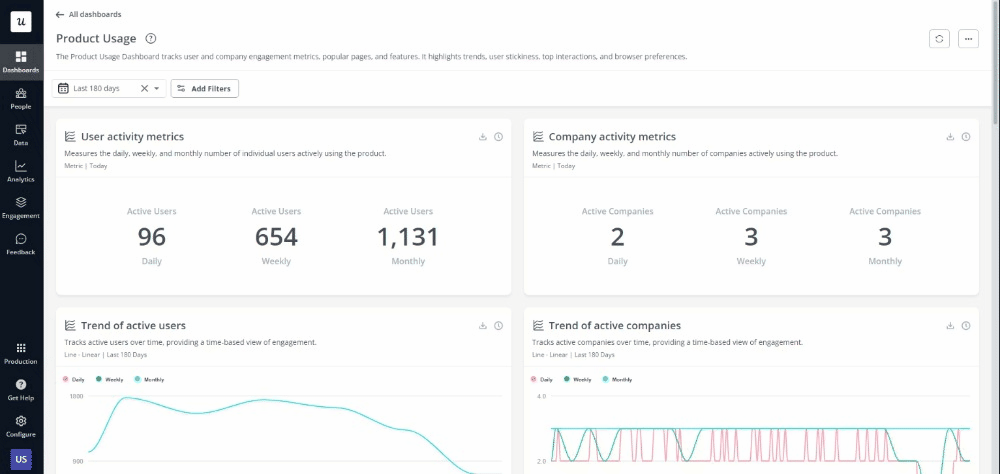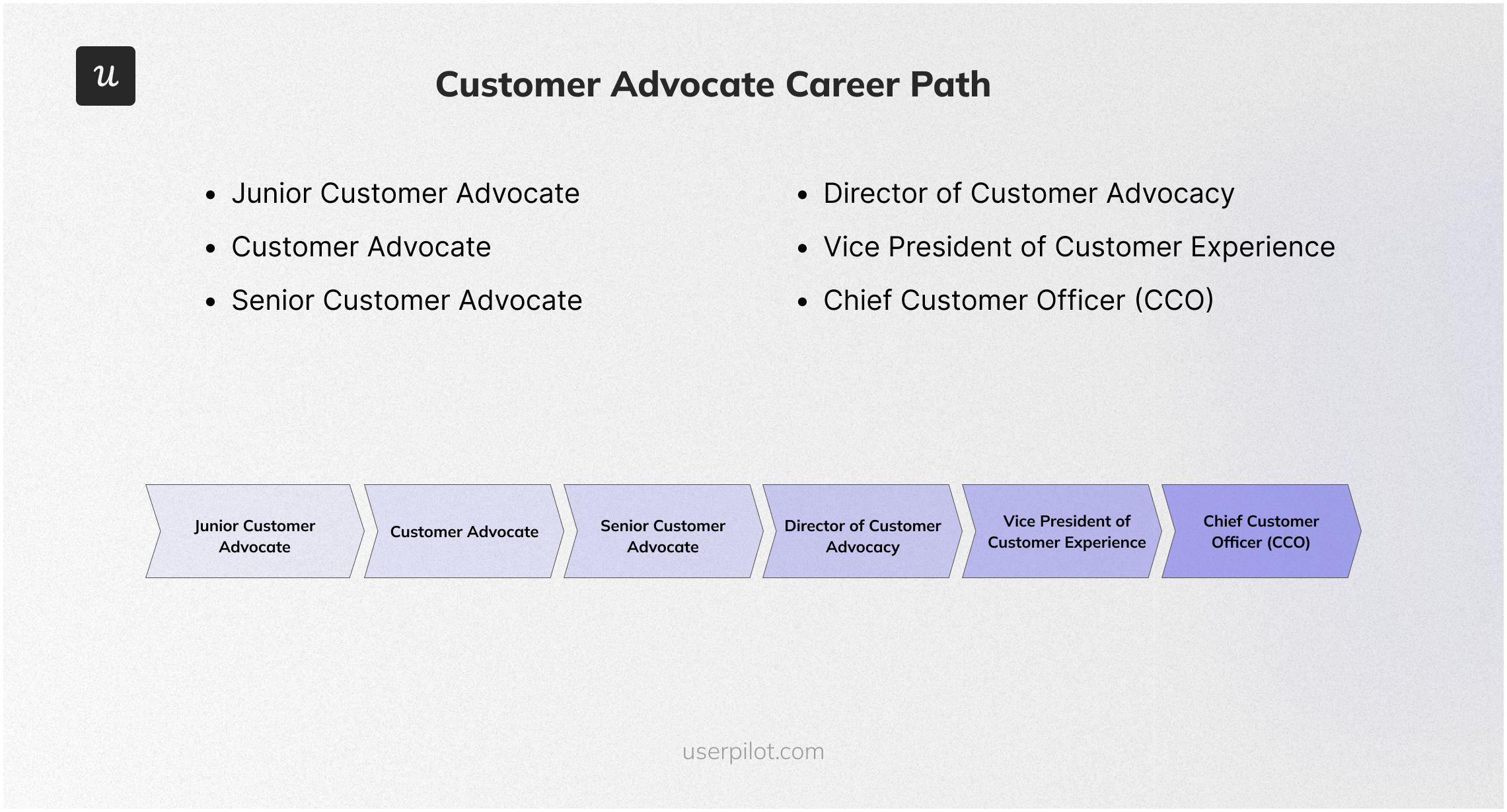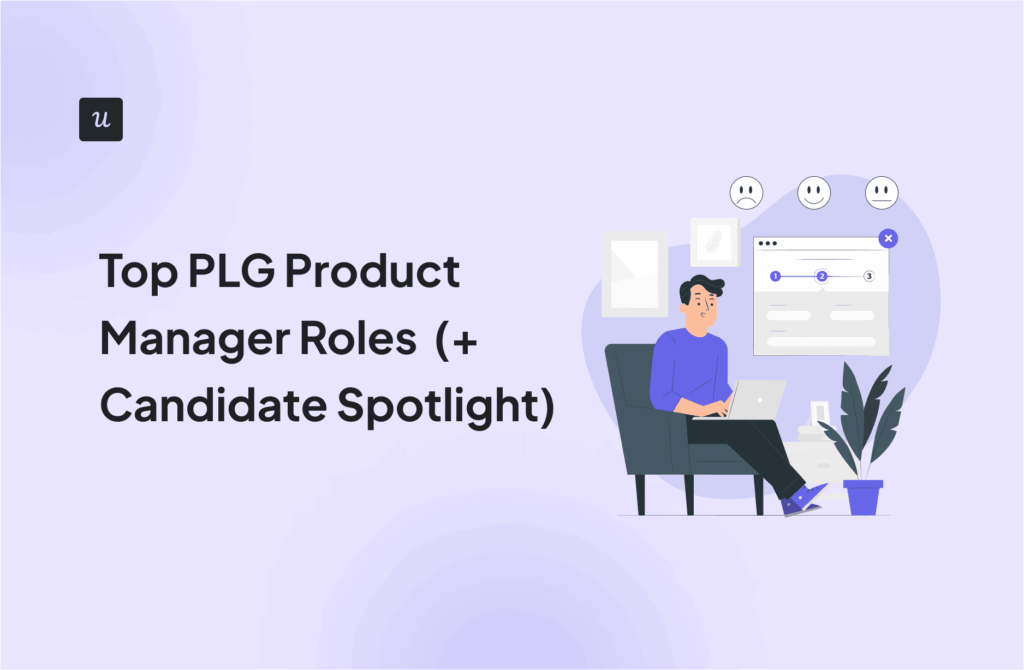![How to Become a Customer Advocate [+Tools and Resources]](https://blog-static.userpilot.com/blog/wp-content/uploads/2024/08/How-to-Become-a-Customer-Advocate-450x295.png)
Embarking on a career as a customer advocate involves a combination of education, skills development, and practical experience.
Whether you’re just starting out or looking to transition into this role, understanding the key steps and requirements is essential.
This guide will provide you with a comprehensive overview of the path to becoming a successful customer advocate.
Let’s dive in!
Try Userpilot Now
See Why 1,000+ Teams Choose Userpilot

TL;DR
- A customer advocate is a professional who represents the customer’s interests within a company, ensuring their needs and feedback are addressed to improve products and services. In the SaaS industry, a customer advocate focuses on understanding user challenges, providing support, and collaborating with internal teams to enhance the user experience.
- The typical career path for a customer advocate includes:
- Junior Customer Advocate (entry-level, addressing basic customer inquiries and assisting senior specialists)
- Customer Advocate (representing customer interests and gathering/analyzing feedback)
- Senior Customer Advocate (managing high-stakes issues, mentoring junior team members, leading initiatives)
- Director of Customer Advocacy (responsible for the strategic direction of the customer advocacy function)
- Vice President of Customer Experience (overseeing all aspects of customer experience and advocacy)
- Chief Customer Officer (CCO) (highest-ranking executive overseeing customer experience and advocacy efforts)
- To become a customer advocate, start with a bachelor’s degree in a relevant field, gain experience through internships or entry-level positions, and develop skills in communication, problem-solving, empathy, and tech-savviness. Certifications in customer service can further enhance your qualifications.
- Customer advocates utilize a variety of tools to enhance their work. Some essential tools include Userpilot for user onboarding and feedback collection, Asana for project management, and Zendesk for CX management.
- Looking into tools for customer advocates? Userpilot is an all-in-one product platform with engagement features and powerful analytics capabilities. Book a demo to see it in action!
What is a customer advocate?
A customer advocate is a professional who represents the customer’s interests within a company, ensuring their needs and feedback are addressed to improve products and services.
In the SaaS industry, a customer advocate focuses on understanding user challenges, providing support, and collaborating with internal teams to enhance the user experience.
Customer advocate’s main responsibilities
A Customer Advocate is essential in representing and addressing customer needs, particularly in the SaaS industry. They work to ensure that customers feel heard and
Main Responsibilities:
- Assist in user onboarding: Help new customers get started with the software, guiding them through the initial setup and feature usage.
- Provide ongoing support: Offer continuous education and support to help customers maximize the value of the product.
- Develop relationships: Build and maintain strong relationships with key customers to foster loyalty.
- Conduct regular check-ins: Engage in regular check-ins with customers to gather feedback and assess their satisfaction with the product.
- Facilitate communication: Bridge communication between customers and internal teams to ensure customer concerns are understood and prioritized.
- Create support documentation: Develop and update user guides and troubleshooting resources to enable customer self-service.
- Monitor support tickets: Oversee customer support tickets to ensure timely resolutions, escalating issues when necessary.
- Improve service quality: Participate in the development of customer support policies and procedures to enhance service quality and efficiency.
Customer advocate career path
From entry-level roles to executive leadership positions, each step on this path builds on a foundation of customer service, product knowledge, and strategic thinking.
Whether you’re just starting out or aiming for the C-suite, this guide outlines the key milestones and progression opportunities within the customer advocacy career ladder, helping you navigate your way to becoming a Chief Customer Officer (CCO).
1. Junior Customer Advocate: As a Junior Customer Advocate, you address basic customer inquiries and assist senior specialists with troubleshooting issues. This entry-level role focuses on learning the company’s products while building foundational skills in customer service. Progress by gaining experience through various customer interactions, participating in mentorship programs, and seeking feedback to continuously improve your performance.
2. Customer Advocate: In this role, you take on more responsibility by representing customer interests within the company. You gather and analyze customer feedback, address more complex issues, and work closely with product teams to ensure customer needs are met. Progress by developing in-depth product knowledge, and leading small initiatives to improve customer satisfaction.
3. Senior Customer Advocate: As a Senior Customer Advocate, you manage high-stakes customer issues, mentor junior team members, and lead larger initiatives to enhance the customer experience. You will also be responsible for developing strategies to drive customer retention by working closely with key accounts and ensuring customers achieve their desired outcomes. Progress by demonstrating leadership skills, managing a small team, contributing to strategic planning and decision-making processes, and showing proficiency in project management.
4. Director of Customer Advocacy: As a director, you are responsible for the strategic direction of the customer advocacy function. You lead a team of customer advocates, set goals, and ensure the organization remains customer-focused in its operations. You will be coordinating efforts across multiple teams to ensure a seamless journey for customers. Progress by exhibiting strong leadership and strategic thinking, engaging with executive leadership, and contributing to the company’s overall vision.
5. Vice President of Customer Experience: This executive role involves overseeing all aspects of customer experience and advocacy within the organization. Your responsibilities will include developing a comprehensive customer experience strategy, leading large teams, and driving significant improvements in customer satisfaction and loyalty. Progress by achieving significant results in previous roles, demonstrating the ability to drive organizational change, and engaging with the board of directors to align customer experience strategies with business goals.
6. Chief Customer Officer (CCO): As the CCO, you are the highest-ranking executive overseeing the entire customer experience and advocacy efforts. You lead strategic initiatives to ensure the organization prioritizes and consistently delivers exceptional customer value. Your role involves leveraging extensive experience in customer advocacy to drive company-wide projects, influence corporate strategy, and foster a customer-centric culture throughout the organization.
How to become a customer advocate?
Starting a career as a customer advocate involves several steps to gain the knowledge and skills needed to succeed in this role.
Here’s a step-by-step guide to help you get started:
- Obtain Basic Education: Start by earning a high school diploma. Consider pursuing a bachelor’s degree in business, marketing, psychology, or a related field. This educational background will give you a strong foundation in understanding human behavior and business operations.
- Develop Soft and Hard Skills Related to the Job: Focus on honing key skills such as communication, problem-solving, empathy, and tech-savviness. Effective communication and empathy are crucial for understanding and addressing customer needs, while tech-savviness helps you navigate customer service software and CRM systems efficiently.
- Gain Practical Experience and Build Your Portfolio: Seek internships in customer service, support, or sales to gain hands-on experience dealing with customers. Document instances where you successfully resolved customer issues, implemented feedback, and improved customer satisfaction. A strong portfolio showcasing these achievements highlights your ability to manage real-world customer interactions and demonstrates your commitment to customer advocacy.
- Get Additional Certifications: Consider obtaining customer service certifications, such as the Certified Customer Service Professional (CCSP). Certifications boost your credibility with employers and clients, demonstrating your commitment to professional growth and excellence in the field of customer service. Certifications can also set you apart from others in the industry and open up new career opportunities.
- Apply for Customer Advocate Roles: Begin your job search by looking for entry-level customer advocate positions. Tailor your resume and cover letter to highlight your relevant skills, experience, and passion for customer advocacy. In your CV, don’t forget to emphasize your hands-on experience and any certifications you have earned.
- Continue Learning and Networking: Stay updated on the latest best practices and trends in customer service by reading industry publications, attending workshops, and participating in webinars. Network with other professionals in the field through industry conferences and platforms like LinkedIn to learn about new opportunities and share insights.
What skills should a customer advocate have?
To excel in this role of a customer advocate, a blend of soft and technical skills is crucial.
Here are the main skills needed for this position and why they are important:
- Excellent Communication: Clear and effective communication is essential for understanding customer concerns and conveying their needs to internal teams accurately.
- Empathy: Understanding and sharing customer feelings helps build strong relationships and trust, allowing Customer Advocates to provide personalized support that meets the unique needs of each customer.
- Problem-Solving Abilities: Strong problem-solving skills enable Customer Advocates to quickly find effective solutions to customer issues, which is vital for resolving complaints and maintaining customer loyalty.
- Product Knowledge: In-depth knowledge of the company’s products or services is necessary for providing sufficient assistance.
- Analytical Skills: The ability to analyze product usage to identify trends and areas for improvement, allowing for data-driven decisions that enhance the customer experience.
- Attention to Detail: Paying close attention to customer feedback and issues ensures nothing is overlooked, which is vital for improving service quality.
- Adaptability: The ability to adapt to changing situations and customer needs is important in a dynamic environment like SaaS, helping Customer Advocates always stay on top of customer expectations.
- Time Management: Efficiently managing time and prioritizing tasks ensures that customer issues are addressed promptly, maintaining high levels of customer satisfaction.
- Tech-Savviness: Proficiency with customer service software, CRM systems, and data analytics tools is essential for getting the relevant tasks done.
Best certifications for customer advocates
Elevating your career as a customer advocate requires more than just on-the-job experience; pursuing certifications can give you a competitive edge, deepen your expertise, and open up new opportunities.
This list of top certifications is designed to help you build critical skills in customer experience, relationship management, and customer success.
- Certified Customer Experience Professional (CCXP) – Offered by the Customer Experience Professionals Association (CXPA), this certification focuses on key aspects of customer experience management, including customer-centric culture, experience design, and metrics.
- Customer Service & Support Manager Certification – Provided by HDI, this certification is ideal for those managing or aspiring to manage customer service teams. It covers leadership, service strategy, and operational efficiency.
- Certified Customer Success Manager (CCSM) – Offered by SuccessHACKER, this certification is tailored for customer success professionals, focusing on relationship management and customer retention strategies.
- Customer Experience Management (CEM) Certification – Offered by Forrester, this certification provides training in designing, implementing, and optimizing customer experience strategies.
- Customer Relationship Management (CRM) Certification – Available through various platforms like HubSpot Academy and Salesforce, this certification covers CRM tools and techniques essential for managing customer relationships effectively.
- Certified Contact Center Manager (CCCM) – Provided by ICMI, this certification is aimed at professionals managing contact centers, focusing on leadership, operations, and customer satisfaction.
Best resources for customer advocates
In order to become a successful customer advocate, you must continually learn and stay informed about the latest trends and best practices. Listed below are some top customer advocacy resources, including books, webinars, podcasts, and blogs.
Best books for customer advocates
Books are a great way to learn new skills and stay informed on industry trends as a customer support specialist. Here are some of our favorite books you need to check out:
- “The Effortless Experience: Conquering the New Battleground for Customer Loyalty” by Matthew Dixon, Nick Toman, and Rick DeLisi: This book challenges the belief that exceeding customer expectations is the key to loyalty. Instead, it argues that reducing customer effort is the most effective way to WOW customers.
- “Customer Success: How Innovative Companies Are Reducing Churn and Growing Recurring Revenue” by Nick Mehta, Dan Steinman, and Lincoln Murphy: Focused on the SaaS industry, this book provides strategies for reducing customer churn and growing recurring revenue by ensuring customer success.
- “Crucial Conversations: Tools for Talking When Stakes Are High” by Kerry Patterson, Joseph Grenny, Ron McMillan, and Al Switzler: Effective communication is essential in customer advocacy. This book offers tools for navigating difficult conversations and resolving conflicts, which are crucial skills for any customer advocate.
- “Your Customer Is the Star: How to Make Millennials, Boomers and Everyone Else Love Your Business” by Micah Solomon: This book provides insights into understanding different customer demographics and tailoring your service approach to meet their unique needs. It’s a great resource for creating inclusive and effective customer service strategies.
- “The Cult of the Customer: Create an Amazing Customer Experience That Turns Satisfied Customers into Customer Evangelists” by Shep Hyken: This book provides strategies for creating a customer-focused culture that goes beyond satisfaction to turn customers into raving fans, driving word-of-mouth referrals for your brand.
Best webinars for customer advocates
Webinars are a fantastic resource for customer advocates because they provide real-time insights directly from professionals who have faced and overcome the same challenges you’re dealing with. They also allow you to engage in conversion and ask any follow-up questions you have.
Here are some top webinars that can help you improve your skills and better serve your customers.
- Userpilot: “Enhancing Customer Experience through Effective Onboarding”: This webinar from Userpilot covers essential strategies for improving customer experience by focusing on the onboarding process. It includes practical tips and real-life examples to help customer advocates create a seamless onboarding experience.
- Zendesk: “Customer Service Best Practices for 2024”: This webinar provides insights into leveraging new technologies, improving response times, and creating a customer-centric culture.
- Salesforce: “Transforming Customer Service with AI and Automation”: Explore how AI and automation can revolutionize customer service in this Salesforce webinar. It covers practical applications of AI, implementation of automation, and benefits for both customers and service teams.
- CX Network: “The Future of Customer Service: Trends and Predictions”: This webinar from CX Network delves into the future of customer service, discussing emerging trends and predictions. It provides valuable insights for staying ahead of the curve and adapting to evolving customer expectations.
- Shep Hyken: “The Cult of the Customer”: Customer service expert Shep Hyken hosts this webinar, where he shares actionable strategies for exceeding customer expectations and building long-term loyalty.
Best blogs for customer advocates
Blogs are an invaluable resource for customer advocates since they are frequently updated, free of charge, and present information in a bite-sized and easily digestible format.
Here are some of the best blogs to follow as a customer advocate to enhance your knowledge:
- Userpilot Blog: Userpilot’s blog offers in-depth articles on onboarding processes, user engagement, and feedback management. It’s a go-to resource for practical tips to improve customer experience and retain customers.
- Help Scout Blog: The Help Scout blog covers a wide range of customer service topics, including communication skills, customer support metrics, and best practices. It’s an excellent resource for both new and experienced customer advocates.
- Zendesk Blog: Zendesk’s blog provides insights into customer service trends, tools, and technologies. It features case studies, expert opinions, and practical tips to help you deliver exceptional customer support.
- Customer Experience Matters by Bruce Temkin: Bruce Temkin, a leading expert in customer experience, shares his insights and research on creating exceptional customer experiences. His blog provides valuable advice on understanding customer needs and driving customer-focused change.
- CX Journey Blog by Annette Franz: Annette Franz’s blog focuses on customer experience management and customer-centric strategies. It provides valuable insights into creating a positive customer experience and improving service delivery.
Best podcasts for customer advocates
Podcasts are a convenient way for customer advocates to learn on the go.
Here are some of the best podcasts we recommend every customer advocate check out:
- “Crack the Customer Code” by Adam Toporek and Jeannie Walters: Covering a wide range of customer service topics, this podcast offers insights into handling complaints and creating memorable customer experiences.
- “The Modern Customer Podcast” by Blake Morgan: Blake Morgan discusses the latest trends and innovations in customer service, featuring interviews with industry leaders and exploring how to create modern, customer-centric businesses.
- “Customer Experience Leaders Chat” by VCC Live: This podcast features conversations with customer experience leaders who share their expertise and insights on customer journey mapping, improving satisfaction, and building effective customer service teams.
- “The Intuitive Customer” by Colin Shaw and Ryan Hamilton: Delving into the psychology behind customer behavior and decision-making, this podcast offers insights into how understanding customer psychology can lead to better service and increased loyalty.
- “Customer Service Revolution” by John DiJulius: John DiJulius discusses strategies for creating a customer service revolution within your organization, featuring interviews with thought leaders and practical advice for transforming your customer service model.
Best tools for customer advocates
Empower your customer advocacy strategy with these essential tools. Each one is designed to help you better understand and address customer needs, ensuring their satisfaction and loyalty.
- Best tool for user onboarding – Userpilot: Userpilot enables customer advocates to create personalized onboarding experiences to enhance user engagement, and design in-app help centers for self-service, all code-free! Furthermore, Userpilot offers features such as in-app survey templates, survey response visualization, and NPS response tagging to track user sentiment.
- Best tool for project management – Asana: A visual platform like Asana makes it easy to manage customer advocacy projects, track tasks, and stay on top of your deadlines.
- Best tool for product management – Jira Software: Jira Software allows users to prioritize issues, and collaborate with product teams, ensuring that findings by customer advocates are effectively incorporated into product development.
- Best tool for CX management – Zendesk: Zendesk provides tools for managing support tickets, live chat, and customer interactions across other channels. It helps businesses streamline customer support operations, and improve response times.
- Best tool for customer success – ChurnZero: ChurnZero helps monitor metrics related to customer health, engagement, and satisfaction, providing valuable insights for designing better user experiences.
- Best tool for UX/UI design – Sketch: Sketch is a powerful design tool that allows you to prototype user-friendly interfaces and collaborate on design processes in real time.
- Best tool for data analytics – Tableau: Tableau enables you to visualize data, and create interactive and shareable dashboards that illustrate patterns, and trends, and help you derive actionable insights.
- Best tool for knowledge management – Confluence: Confluence allows you to create, share, and organize documentation, ensuring your team stays on the same page with the company mission and procedures.
- Best tool for customer support – Freshdesk: Freshdesk is a cloud-based customer support software that helps businesses manage customer inquiries and support tickets efficiently. It offers features such as automated workflows, multi-channel support (including email, phone, chat, and social media), and a knowledge base to address customer inquiries.
- Best tool for customer support – Freshdesk: Freshdesk is a cloud-based customer support software that automates routine tasks like ticket assignments and status updates, allowing support teams to focus on resolving issues. It also organizes customer queries from different channels into tickets that can be tracked and managed through a centralized system, ensuring no request goes unnoticed.
- Best tool for customer relationship management – HubSpot Service: HubSpot Service provides tools for collecting and analyzing customer feedback, helping you understand customer needs and iterate your offerings based on real insights.
Customer advocate FAQs
- What is the role of a client advocate?
A client advocate supports and represents clients’ needs within an organization, ensuring their feedback is heard, and their issues are resolved effectively.
- What is an example of customer advocacy?
An example of customer advocacy is a company implementing changes based on customer feedback, such as adding a new feature that customers requested to improve to meet their expectations.
- How to measure customer advocacy?
Customer advocacy can be measured using metrics like Net Promoter Score (NPS), customer satisfaction surveys, and tracking customer referrals and positive reviews.
- How to act as a client advocate?
To act as a client advocate, listen actively to client concerns, communicate their needs clearly to internal teams, ensure their input is considered in decision-making, and follow up to ensure their issues are resolved and their expectations are met.
Conclusion
Becoming a successful customer advocate requires dedication, continuous learning, and a proactive approach to developing relevant skills.
By following the outlined steps and leveraging the resources available, you can effectively navigate your career path and achieve your professional goals.
We hope this guide has provided you with valuable insights and practical advice to help you on your journey to becoming a proficient and impactful customer advocate!
Looking into tools for customer advocates? Userpilot is an all-in-one product platform with engagement features and powerful analytics capabilities. Book a demo to see it in action!









